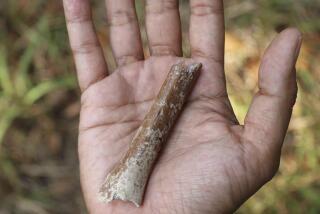Study Adds a Million to Age of Humanity
- Share via
Humanity’s great-grandparents may be a million years older than previously believed, according to researchers who recalculated the age of important prehuman remains in South Africa using cosmic rays and radioactive decay.
The new dating -- based on a controversial and still experimental technique -- may force experts in human origins to reassess the earliest beginnings of humankind. It suggests that these early human ancestors ranged throughout Africa 4 million years ago.
“It is exciting, groundbreaking work,” geochronologist Paul Renne at the Berkeley Geochronology Center said of the new dating technique. “I wish I had thought of it.”
In research made public Friday, scientists from Purdue University and the University of the Witwaterstrand investigated the age of the Sterkfontein Caves northwest of Johannesburg, arguably the richest known concentration of early human fossils and one notoriously difficult to date accurately.
They concluded that a nearly complete skeleton of a prehuman creature called Australopithecus africanus discovered there in 1997 and a set of newly discovered bones from an adjacent limestone cavern were 4 million years old, making them among the oldest such fossils known.
Previous age estimates of the nearly 500 prehuman fossils found in the caverns ranged from 1.5 million to 3 million years.
To arrive at the new estimate, Purdue geologist Daryl E. Granger and his colleagues worked out how long the fossils had been buried by measuring the decay of two distinctive radioactive isotopes in cave sediments, which form when material at the Earth’s surface is bombarded by cosmic rays.
Once the rocks are buried, production of the isotopes stops. The scientists can measure their slow decay to determine how much time has passed since the rock lay near the surface.






